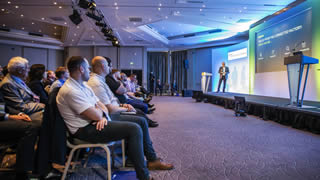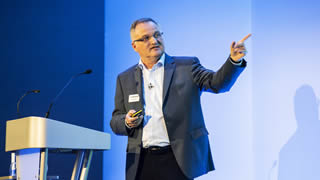Connected Data Leads To New Solutions
Hexagon Manufacturing Intelligence event explores the state of manufacturing and uncovers new paths to the smart factory
“Data can save the future of manufacturing.” Those are the words of keynote speaker Norbert Hanke at a major Hexagon event which showed an insight into the future of manufacturing and addressed new ways to achieve a competitive edge. “Data will power a successful digital ecosystem which is smart and fully connected.”
Hexagon presented its integrated solutions at the HxGN LOCAL Smart Manufacturing UK forum, and supported the ‘smart factory’ ethos with an array of keynote speakers, who brought the concept closer to modern manufacturers’ everyday experiences. The topics, which are of vital concern to UK businesses, included automation, autonomous mobility, smart factories, future workforce skillset requirements, and the impact of the current economic climate.
A live exhibition zone featured a range of Hexagon solutions for harnessing data to improve processes from design and engineering through to production and metrology. It showed how the digital and real manufacturing worlds merge in the production of tomorrow, and how SMART technologies mesh seamlessly with each other.
Norbert Hanke, President of Hexagon’s Manufacturing Intelligence Division, told delegates that with politics affecting industry more and more, there’s the need now for agility like never before. “Manufacturers need to build a smart, resilient business model with more personalisation and better quality products.”
And smart factories are at the heart of this, being data-driven, connected and intelligent. “Data is at the core of the digital transformation, so we need to put four types of data to work. These are: descriptive, diagnostic, predictive, and prescriptive. This will improve efficiency and quality, while reducing costs, leading to sustainability. Connected data offers a new level of insight, leading to new solutions.”
He said the main aspects of the smart factory are design and engineering, quality and productivity, production, and customers. “Hexagon is building smart into all our solutions, making manufacturing, smarter.”
Raf Lobato, Strategic Product Development Director for Hexagon’s Production Software business, discussed insights into UK manufacturing, and the latest innovations in smart factories. “Changing isn’t the risk. Not changing is the risk. Hexagon is developing an ecosystem for smarter manufacturing by helping you maximise your existing assets while continuing to run your businesses on a daily basis.”
Another keynote speaker, acclaimed futurist Stefan Hyttfors, looked at disruptive technologies, behavioural change, and next generation leadership. He said manufacturers should know five things about the future:
- Speed is key
- Generations are becoming new cultures, and adapting
- Data first – this is the core
- Sustainable or unsustainable – solving a problem or creating a new one
- Trust will differentiate, as more people have access to technology
Delegates also attended a number of breakout sessions with speakers who are experts in their field, including financial and political journalist Daisy McAndrew asking: “Brexit – what the hell is going on?”
She explained that predictions showed a hard Brexit would pull UK manufacturing down by ten per cent, and a soft Brexit by three per cent in the short term. But it would bounce back. “Although no deal is frightening for anyone in business, the uncertainty is worse. It’s not all doom and gloom, but there is a bumpy ride ahead. There is hope for the manufacturing industry with Brexit.”
And Ben Morgan, from the Advanced Manufacturing Research Centre showed delegates how factories of the future would utilise reconfigurable manufacturing and AI. He highlighted statistics from 2017 which showed the UK was behind other advanced nations in overall production, due in part to lower levels of digital and automation technology.
Describing a ‘reconfigurable factory’ as undertaking the bespoke manufacture of products, he said this was achieved through being highly automated, evolving with new technology, digitally connected, having metrology at its core, and an adaptable workforce.
Delegates were particularly interested to hear that there is considerable potential for AI to play an important role in the automated inspection of parts.
The overall theme of the event was driven by the current climate: looking at where manufacturing is now and where is it going. David Brown, UK General Manager for Hexagon’s Manufacturing Intelligence division, said the event showed UK manufacturers all aspects of the division coming together.
“Buzzwords were ‘Smart,’ and ‘Factory of the future,’ and we demonstrated to our customers that we’re already in that space. Manufacturers face a huge number of challenges today, from the political and economic climate to the need to improve sustainability. Hexagon is working with manufacturers to better utilise technology to overcome these challenges, and this event detailed concepts that they can implement into their business to gain a competitive edge and deliver high quality products and services to their customers.”












